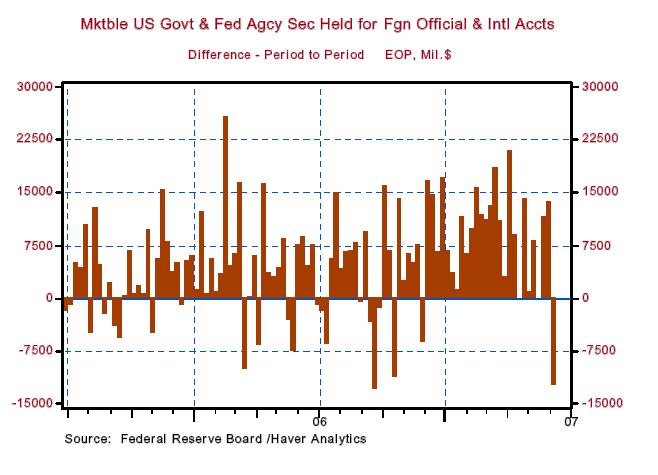What’s the Deal with US Bond Yields?
Interest-Rates / US Bonds Jun 09, 2007 - 03:14 PM GMTBy: Paul_L_Kasriel
 Why have bond yields moved so violently upward this past week? Well, yes, some of the data last week were stronger than expected. But come on, May nonfarm payrolls increasing 157,000, getting a boost from 203,000 assumed (birth/death adjustment) workers being added to unadjusted payrolls, and coming on the heels of an 80,000 increase in April is hardly the stuff of the bond market massacre we have witnessed this week.
Why have bond yields moved so violently upward this past week? Well, yes, some of the data last week were stronger than expected. But come on, May nonfarm payrolls increasing 157,000, getting a boost from 203,000 assumed (birth/death adjustment) workers being added to unadjusted payrolls, and coming on the heels of an 80,000 increase in April is hardly the stuff of the bond market massacre we have witnessed this week.
Central banks around the world raising rates? This is nothing new. And with all due respect to the honorable Reserve Bank of New Zealand, I don't think that a central bank of an economy with a lower GDP than that of Chicago (I'm guessing here), could cause such a stir in the U.S. bond market. Inflation? Last time I looked, inflation was moderating - with or without food and energy. Shift in Fed policy expectations? Yes, two Street firms through in the towel on 2007 Fed rate cuts this week, but they were hold-outs. (Now it is just me and a few other diehards). No, for credible explanation of the exaggerated move in bond yields this week, I think it is Wall Street Journal columnist, Justin Lahart, who has put his finger on it ("Mortgage Jitters May Account For Bond Selloff"). When bond yields started creeping up a few weeks ago, mortgage portfolio prepayment risk started creeping down.
This meant that the massive amount of mortgages in portfolios needed fewer non-callable Treasuries as duration maintainers. I am not saying that something perceived to be fundamental by bond investors has not changed. But what Lahart is saying is that the massive duration hedging required by mortgage portfolios acts as a supercharger to fundamentally-induced changes in yields. Remember 1994?
I will, however, add one fundamental factor that may have played a smaller role in this week's bond market selloff - foreign official holdings of U.S. Treasury and Agency securities. As the chart below shows, in the week ended Wednesday, June 6, there was a relatively large $12.5 billion reduction in these custody holdings.

By Paul L. Kasriel
The Northern Trust Company
Economic Research Department - Daily Global Commentary
Copyright © 2007 Paul Kasriel
Paul joined the economic research unit of The Northern Trust Company in 1986 as Vice President and Economist, being named Senior Vice President and Director of Economic Research in 2000. His economic and interest rate forecasts are used both internally and by clients. The accuracy of the Economic Research Department's forecasts has consistently been highly-ranked in the Blue Chip survey of about 50 forecasters over the years. To that point, Paul received the prestigious 2006 Lawrence R. Klein Award for having the most accurate economic forecast among the Blue Chip survey participants for the years 2002 through 2005.
The opinions expressed herein are those of the author and do not necessarily represent the views of The Northern Trust Company. The Northern Trust Company does not warrant the accuracy or completeness of information contained herein, such information is subject to change and is not intended to influence your investment decisions.
© 2005-2022 http://www.MarketOracle.co.uk - The Market Oracle is a FREE Daily Financial Markets Analysis & Forecasting online publication.


